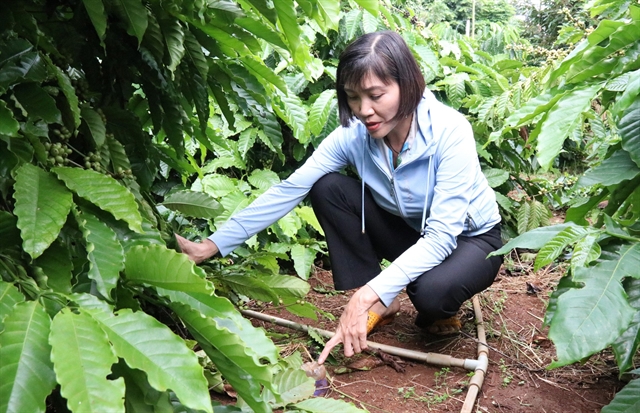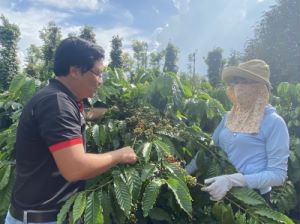 Economy
Economy


|
| Mai Thị Nhung introduces the use of water bottles to measure soil moisture and cow's milk cans to measure rainwater. — VNS Photo |
By Vũ Hoa
HÀ NỘI — Women play a crucial role in agriculture and rural areas. By empowering them economically and socially, we create opportunities for women to enhance their skills, adapt to new opportunities, and make significant contributions to ecological agriculture, modern rural areas, and the development of civilised farmers in Việt Nam, experts said.
One example is Mai Thị Nhung, the leader of a female farmer group participating in the NESCAFÉ Plan programme. Residing in Ea Tiêu Commune, Cư Kuin District, in Đắk Lắk Province, Nhung joined the programme in 2015 with the aim of gaining knowledge and practising sustainable agriculture. Through active involvement, she was elected as the group leader in 2019 and now oversees 72 member farmers, with over 42 per cent being women and local residents.
“Before participating in the programme, my family cultivated coffee according to traditional practices. The coffee trees were old, used old varieties, and productivity and quality were not high. My family's coffee output was only about 2.5 tonnes per hectare. Furthermore, unsustainable agricultural practices caused the cost of fertilisers and pesticides to increase, so we did not calculate costs and profits,” she said.
Since participating in the NESCAFÉ Plan programme, she has renovated the old coffee garden and replanted it in 2017, by choosing new high-yielding, pest-resistant varieties, reasonable intercropping and practising regenerative agriculture.
Specifically, she was instructed to apply a reasonable model of intercropping coffee and pepper, making the coffee output in 2022 reach 3.5 tonnes, pepper output of 2.5 tonnes, and durian output of 1.5 tonnes per hectare. Participating in the programme, she also received training on sustainable coffee farming techniques towards regenerative agriculture.
By applying the learned knowledge to the coffee garden, the amount of chemical fertilisers was reduced by 20-30 per cent by increasing organic fertiliser and composting coffee husks as microbial fertiliser, helping improve soil and enhance microorganisms. Using water bottles to measure soil moisture and cow's milk cans to measure rainwater helps her garden save nearly 50 per cent on irrigation water and related costs compared to before.
In particular, Nhung's family also received support from the digital transformation application programme through the farmer's diary application on the phone, helping track investment costs and profits from coffee and pepper.
Nhung's success story exemplifies the positive impact of empowering women in agriculture and the transformative potential of sustainable farming practices facilitated by programmes like the NESCAFÉ Plan.

|
| A member of Nestlé Vietnam teaches farming techniques to Mai Thị Nhung under the NESCAFÉ Plan programme. — VNS Photo Vũ Hoa |
Lê Thị Hoài Thương, Senior corporate affairs manager, Nestlé Vietnam, said: “Nestlé Vietnam Co Ltd considers Việt Nam a significant market for coffee raw materials within the Nestlé Group. Recognising the importance of sustainable development, both for Việt Nam's coffee industry and the overall well-being of the community, the company is committed to long-term and stable growth.”
Since 2011, Nestlé Vietnam has been implementing the NESCAFÉ Plan programme in Việt Nam. This initiative aims to introduce sustainable farming techniques and promote the regenerative agriculture model among coffee farmers. To achieve this, the company has collaborated with the Western Highlands Agriculture and Forestry Science Institute (WASI) to develop resilient coffee varieties that are of high quality and resistant to pests and drought.
“As part of our efforts, Nestlé Vietnam has provided 63.5 million seedlings for the replanting programme in the Central Highlands provinces. Additionally, the company has conducted 330,000 training courses on sustainable coffee farming, focusing on regenerative agriculture, and benefiting farmers across the region. Nestlé has established connections with 21,000 farming households, assisting them in adopting sustainable coffee production practices based on the 4C criteria,” she added.
She said that in addition to indicators on environmental protection, reducing emissions and improving livelihoods, gender equality and women's empowerment are also one of the focuses in the NESCAFÉ Plan programme. Previously, in all stages, from farming to harvesting coffee, both genders participated, but participation in training programmes was often undertaken by men.
"The fact that women are not allowed to participate in training will affect their ability to make reasonable decisions in farm management. Therefore, the NESCAFÉ Plan programme has contributed to changing thinking about the right to access knowledge through training sessions as well as women's participation in the decision-making process," she added.
In addition to training programmes, NESCAFÉ Plan has promoted the application of information technology to save women time in managing farm households as well as help women clearly understand income and expenditure, farming schedules and harvest promptly and reasonably.
When participating in the programme, women's decisions have more basis and voice in the family and community. Of the 21,000 farming households participating in the NESCAFÉ Plan programme, with 274 farmer groups, more than 30 per cent of women are holding group leader roles. They are group leaders, becoming better inspirers and persuaders for the community.
Nguyễn Đỗ Anh Tuấn, Head of the International Cooperation Department under the Ministry of Agriculture and Rural Development (MARD), said Việt Nam's agricultural sector has seen many important achievements in recent years, maintaining high growth.
However, in addition to the above achievements, raising awareness and capacity on aspects of gender equality and women's empowerment in the food and agriculture sector should be paid attention, he said.
Currently, female workers in the agricultural sector account for over 47 per cent, especially in co-operatives, accounting for 80 per cent. This figure shows that women have been making many positive contributions to socio-economic development, especially in agriculture.
“Women have an important role in ensuring a sustainable future, but often face many difficulties in participating in all aspects of the value chain as well as limited access to resources, opportunities and rights. The lack of women's empowerment also affects sustainable development in agriculture. If women are not guaranteed rights and opportunities to participate in the agricultural production process, agricultural models will lack the diversity and creativity that women can contribute," he said.
He added that in the context of climate change, taking advantage of women's intelligence and acumen in managing resources and applying climate-smart initiatives in agriculture is very important.
“Strengthening the role of women in agriculture requires a focus on building gender-equitable relationships, providing training and development opportunities for women farmers, and creating an environment that promotes equity. This requires great awareness, support and effort from not only the Government but also the private sector, businesses and social organisations to participate, ensuring that women have an important and equal role in agriculture, contributing to the sustainable development of the industry," he added. — VNS




